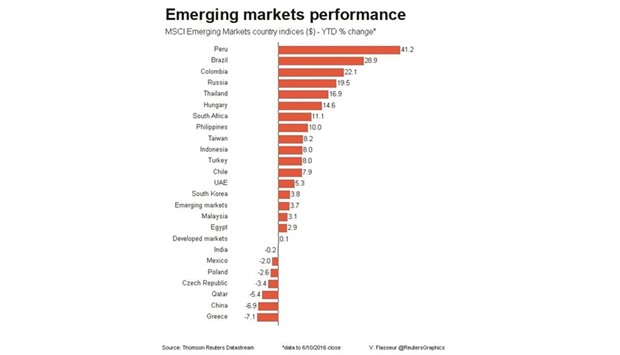Emerging market stocks saw their biggest fall since February yesterday as anxiety grew ahead of a referendum on Britain’s potential exit from the European Union and a US Federal Reserve policy meeting.
Data pointing to a slowdown in China’s economy and a break back to $50 a barrel for oil added to the pressures, with MSCI’s benchmark EM index declining 1.7% to take its losses over the last three sessions to over 4%.
Brexit jitters found traction in eastern Europe as Polish zloty and Hungarian forint volatility forwards surged to their highest in a year and six months respectively.
Poland has especially close links to the UK with more than 850,000 of its citizens living in Britain and a net inflow of 20,000-30,000 going there each year.
Eastern European exports to Britain as percentage of GDP are also significant.
The Czech Republic is most exposed at around 4.6% of GDP, followed by Poland at around 3% and Hungary at around 2%, according to Morgan Stanley.”There is increasing concern about Brexit as the (June 23) vote gets closer and the market is now in a risk-off mode,” said TD Securities head of emerging markets strategy Cristian Maggio.
Concerns about a slowdown in China’s giant economy were fanned by data showing the growth in fixed-asset investment slipped below 10% for the first time since 2000 and investment by private firms slowed to a record low.
Chinese stocks closed down over 3%, their biggest tumble since February, as investment in real estate also posted its first year-on-year slowdown in growth since December, though property sales by area surged 32%.
”These leading indicators seem to be telling us that the Chinese economy won’t be as strong this quarter and going forward,” UBS economist Manik Narain said.
China does not want a trade war with Europe, Premier Li Keqiang said yesterday at a news briefing alongside German Chancellor Angela Merkel, who called for more talks with Beijing on its market economy status under the World Trade Organisation.
China watchers are also gearing for a decision today by equity index provider MSCI on whether to add domestically-listed Chinese stocks, also known as A-shares, to its EM benchmark.
It already includes Chinese shares listed in other parts of the world and the addition of A-shares would be a symbolic step.”We haven’t really seen any ability of Chinese stocks to rally ahead of the MSCI decision,” said Narain, who expects MSCI to start by adding around 5% of A-shares from next June, before building the amount up over a number of years.”China’s share (of EM index) could grow from 25-26% now to around 40%,” he said.
Elsewhere, Russia’s rouble fell for its third day running as oil prices broke below $50 a barrel.
Emerging Asian currencies also lost ground against the safe-haven yen as the Japanese currency touched a three-year high against both the euro and sterling on Brexit nerves and ahead of meetings of both the Bank of Japan and Fed this week.

..
